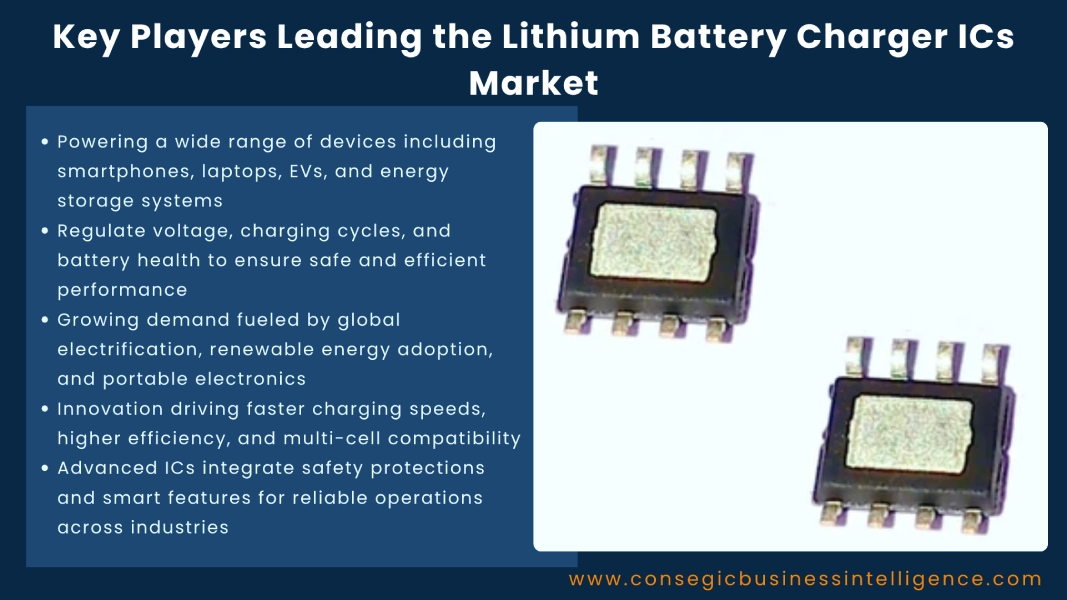Key Players Leading the Lithium Battery Charger ICs Market
Lithium battery charger integrated circuits (ICs) are essential components in powering the devices that drive our digital lives. From smartphones and laptops to electric vehicles (EVs), wearables, and energy storage systems, these ICs regulate voltage, manage charging cycles, and ensure safe, efficient battery use. As industries move toward electrification, renewable energy adoption, and portable electronics, the demand for advanced lithium battery charger ICs is growing rapidly. Global players are investing in innovation to provide solutions with faster charging, higher energy efficiency, multi-cell support, and built-in safety protections.

Let us explore the key companies that are leading growth in the lithium battery charger ICs market worldwide.
- Texas Instruments (TI)
Texas Instruments is one of the most established players in the battery management space. The company’s wide portfolio includes linear, switch-mode, and wireless charging ICs designed for consumer electronics, automotive, and industrial markets. Texas instruments also focus on fast charging, thermal management, and integration with power management ICs, making it a preferred choice for OEMs globally.
- Analog Devices, Inc. (ADI)
Analog Devices is known for high-performance charger ICs that deliver precision and efficiency. Its solutions cater to automotive, industrial automation, and healthcare devices where reliability is critical. ADI emphasizes safety features, accurate charge monitoring, and support for high-capacity battery packs, positioning itself strongly in mission-critical applications.
- STMicroelectronics
STMicroelectronics offers versatile charger ICs that support single and multi-cell lithium batteries. Its products are used across smartphones, wearables, IoT devices, and EV systems. The company invests in integrating protection mechanisms such as overvoltage, short-circuit, and thermal safeguards, aligning with growing regulatory and consumer demands for safer energy solutions.
- NXP Semiconductors
NXP has established a strong presence in automotive and industrial power management. Its charger ICs are optimized for in-vehicle electronics, EV battery systems, and portable devices. NXP focuses on combining efficiency with secure interfaces, enabling smart energy management for connected applications.
- ON Semiconductor (onsemi)
ON Semiconductor delivers a broad portfolio of power and charging solutions. Its charger ICs emphasize energy efficiency and compact design, making them suitable for consumer gadgets and automotive electronics. The company is also pushing advancements in fast charging and high-current applications, aligning with trends in EVs and 5G devices.
- Maxim Integrated
Maxim Integrated, acquired by Analog Devices, remains a recognized brand in power and battery management. Its charger ICs are widely used in wearables, smartphones, and portable medical devices. Maxim’s focus on ultra-low-power designs and integrated safety features supports applications where compactness and reliability are key.
- Renesas Electronics Corporation
Renesas offers highly integrated charger ICs for automotive, industrial, and consumer markets. Its solutions often combine battery charging with monitoring and power path management functions. Renesas emphasizes designs that support fast charging and efficient power conversion, making it a strong player in EV and renewable energy applications.
- Microchip Technology Inc.
Microchip provides a range of battery charging and monitoring ICs targeted at embedded systems, IoT devices, and energy storage. Its products are known for flexibility, supporting multiple chemistries and charging profiles. Microchip focuses on integrating charger ICs into larger microcontroller ecosystems, offering seamless design for developers.
- ROHM Semiconductor
ROHM designs battery charger ICs with a strong focus on efficiency, safety, and compact size. Its solutions are widely adopted in smartphones, wearables, and industrial applications. ROHM emphasizes built-in protections, high integration, and fast charging support, catering to the growing need for miniaturization in consumer electronics.
- Infineon Technologies
Infineon delivers charger ICs that are particularly strong in automotive and renewable energy markets. Its focus on high-voltage, high-reliability applications positions it well for EV charging and grid storage solutions. Infineon also invests in GaN and SiC technologies to improve efficiency and performance in next-generation power electronics.
Conclusion
The lithium battery charger ICs market is central to the growth of portable electronics, electric mobility, and renewable energy systems. Companies such as Texas Instruments, Analog Devices, STMicroelectronics, NXP, ON Semiconductor, Maxim Integrated, Renesas, Microchip, ROHM, and Infineon are leading this transformation with solutions that balance performance, safety, and efficiency. As demand rises for faster charging, higher energy density, and safer battery operations, these players are set to drive further innovation. With applications spanning from consumer devices to electric vehicles and industrial systems, lithium battery charger ICs will remain at the forefront of powering the connected and electrified future.
